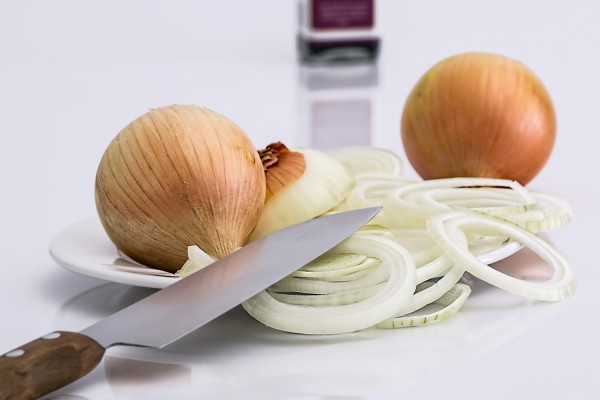5 Benefits and Some Disadvantages You Can Get From Onions

While onions are undeniably advantageous to one’s health, eating them can lead to problems for another.
Aside from adding flavor to dishes, onions are filled with a lot of nutrients. According to a nutritionist, Victoria Jarzabkowski, these "flavorful bulbs" are "super-healthy."
Jarzabkowski, a nutritionist from the University of Texas, also said, onions are "excellent sources of vitamin C, flavonoids, and phytochemicals."
Studies have it that onions may contribute to the reduction of risk of certain health conditions such as Parkinson's disease, stroke and cardiovascular disease.
Additionally, an especially valuable flavonoid found in onions is also called "quercetin," an antioxidant possibly associated with the prevention of cancer.
Registered dietitian nutritionist, Angela Lemond, who's also a spokesperson for the Academy of Nutrition and Dietetics said, onions might have benefits for heart health. However, she said, "more studies need to be done."
ALSO READ: 4 Best Beverages You Can Drink If You Have Diabetes
Benefits Onions Can Give
If you are not an onion eater, now is the best time to consider including the so-called flavorful bulb in your daily meals. Here are some of the reasons why onions are essential to your diet:
1. Good for the Heart
Jarzabkowski said, onions promote "a healthy heart in various ways" like reducing blood pressure, and lowering the risk for heart attack.
A 2002 study published in Thrombosis Research journal proposed that sulfur functions as a "national blood thinner" and stops blood platelets from accumulating.
Additionally, the quercetin found in onions is also a great contributor to the prevention of buildup of plaque in the arteries, which lowers the risk of stroke and heart attack.
2. Anti-Inflammatory Function
The sulfurs in onions may work effectively as "anti-inflammatory agents." This was according to a study published in the International Archives of Allergy and Applied Immunology in 1990.
Another research made in 2013 indicates that quercetin has been discovered to relax the muscles' airway, and may offer relief of symptoms of asthma.
3. Strengthens the Immune System
Washington DC-based, dietitian, Anne Mauney said, the "polyphenols found in onions" function as antioxidants, shielding the body from free radicals.
In addition to this, the University of Maryland Medical Center stated that the quercetin in onions reduces the allergic response too, by preventing the body from producing histamines, the main cause of sneezing, crying and itching, if you are experiencing an allergic reaction.
DON'T MISS THIS: 5 Reasons for Eating Oatmeal During Breakfast
4. Cancer Risk Reduction
A meta-analysis made in 2015 found that consumption of allium vegetables which included onions was linked to risk of "gastric cancer."
Experts said that eating from one to seven onions of servings each week may contribute to the reduction of risk of certain conditions such as laryngeal, ovarian and colorectal cancer.
5. Blood Sugar Regulation
The chromium which an onion contains help regulate blood sugar. On the other hand, the sulfur which an onion also has helps lower blood sugar through the activation of increased production of insulin.
A 2010 study indicated that onions might be particularly helpful to individuals who have diabetes. Furthermore, those with Type 1 and Type 2 diabetes who consumed red onions showed lower levels of blood sugar for a maximum of four hours.
Drawbacks of Consuming Onions
While onions are undeniably advantageous to one's health, eating them can lead to problems for another. Specifically, the carbohydrates in this vegetable, according to the National Digestive Diseases Information Clearinghouse, may result in "gas and bloating."
More so, a study published in the American Journal of Gastroenterology stated that onions, especially when eaten raw, can make heartburn in an individual suffering from a gastric reflux disease worse.
Lastly, consuming large amounts of green onions, or swiftly increasing consumption may inhibit with "blood-thinning drugs." Notably, green onions have a high amount of Vitamin K, which can possibly "lower blood thinner functioning."
IN CASE YOU MISSED THIS: What Happens to Your Heart When You Eat Healthier
Aug 05, 2020 06:00 AM EDT





